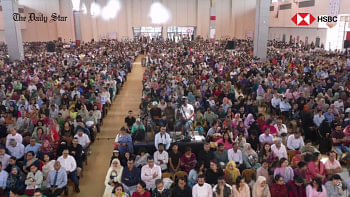Persistent unrest in RMG sector
This is for the umpteenth time in recent months that the garment workers enraged by default on payment by the factory owners took to the street, blocked the traffic and vandalised vehicles. All these were topped off by the police roughing them up, including women workers. Just the venue changed -- it was Shawrapara on Sunday.
What defies comprehension is the perennial nature of the problem. When the tripartite agreement had been reached at the fag-end of the BNP-led coalition government providing for the minimum salary and other benefits for the workers, one had thought that the issue stood resolved. But that was not to be; several factory owners reneged on the agreement and grievances over non-payment of dues and maltreatment of workers would surface again and again subsequently.
This way productivity suffers, contractual obligations as to the timing of delivery of consignments are not complied with. In the post-MFA period, when sheltered markets are no longer in vogue and the RMG market has become a field for fierce open competition, the buyers are quick to switch market choices. No wonder, before this winter, Bangladesh was faced with a series of order cancellations. We cannot afford this anymore bearing in mind the fact that the garment sector fetches 70 percent of our export earnings.
Now things are looking up in terms of import orders as winter has taken hold in the west and that is more the reason why we should find appropriate solutions to the interminable eruptions of labour agitation.
We suggest that some kind of a roving body in the nature of a mobile court be formed with representatives from the textile ministry, labour ministry and BGMEA headed by a judge with the power to redress legitimate demands of the workers on the spot, or very quickly. Such a body doing justice to both the poor workers and owners (who are genuinely in financial trouble) will gain the trust of workers and prevent the latter from going for wildcat agitation or industrial action.
Of course, the longer term agenda cannot be abandoned. The root cause of the trouble having to do with large profits made by owners vis-à-vis poor salary structure and terms and conditions of service is seldom looked into, far less addressed on a durable basis. The perception among the workers that they are being exploited, needs to be removed by a set of concrete confidence building measures leading to enhancement of service security and salary adjustments compatible with inflation rates.

 For all latest news, follow The Daily Star's Google News channel.
For all latest news, follow The Daily Star's Google News channel. 



Comments